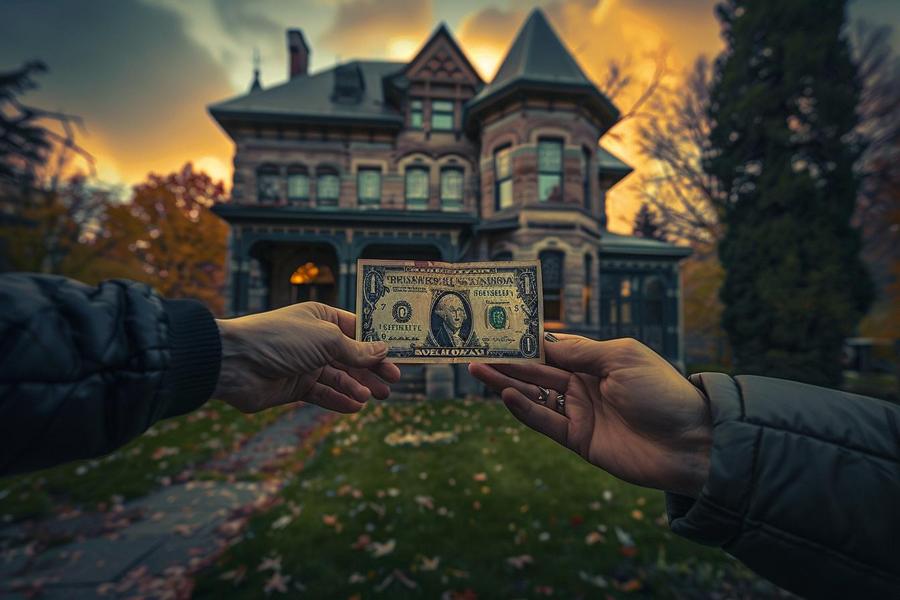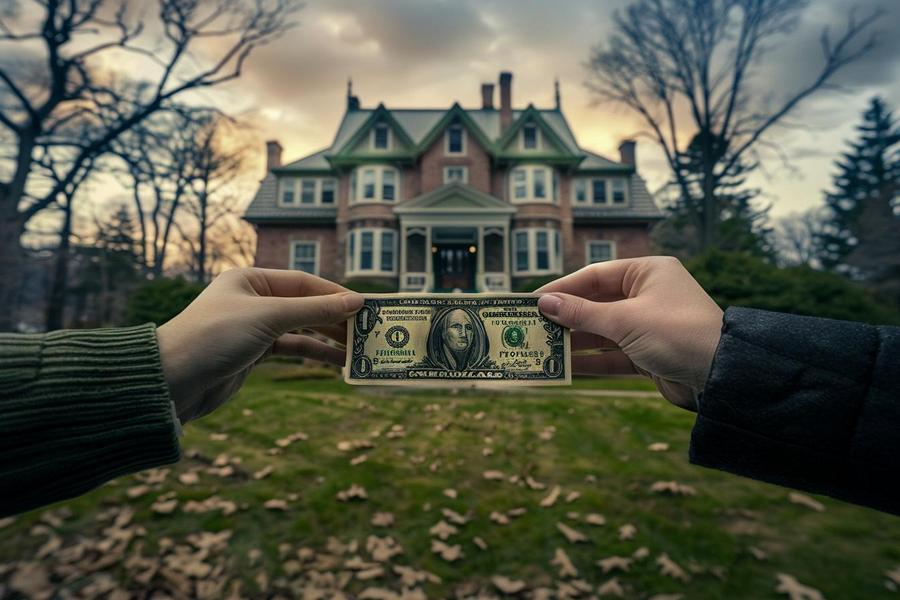Ever wondered what it really means when a house sells for $1? The $1 house sale exists as more than just a printing error. The process continues to move forward during emergency property sales and distressed property sales, even in places like sell my house fast in Richmond situations. My experience with over 1,000 real estate deals has shown me these kinds of unusual transactions firsthand. This guide from Eagle Cash Buyers explains the actual process behind home sales by revealing both legal obstacles and tax consequences and market changes which affect sellers and buyers.
TL;DR:
- Legal paperwork and possible gift tax for sellers; buyers may face higher property taxes.
- The process occurs when families transfer property to each other while they aim to reduce their tax payments.
- The process of neighborhood transformation through urban renewal tends to reduce property values in nearby areas. But it leads to new construction projects.
- The inspection process together with alternative financing methods helps buyers avoid expensive repair expenses.

What are the Legal and Tax Implications of Selling a House for $1?
Understanding the Legal Framework
The sale of a $1 house requires the same legal procedures which apply to all property transfers. The deed needs to receive an update. The document requires signatures from both parties. Then it gets recorded with the local government. The price might seem symbolic, but once those documents are properly filed, the sale becomes just as binding as any million-dollar mansion deal. Attorneys I have worked with throughout these deals maintain that documentation holds equal value at any price point from $1 to $1 million.
Navigating Tax Implications
Here’s where things get tricky. The IRS doesn’t care that you sold your house for a dollar. They determine value according to market prices which exist in the open market. You decide to sell your $200,000 home to your nephew for $1. The IRS would view the $199,999 difference as a gift which could lead to gift tax liability if the amount exceeds the yearly exclusion threshold of $17,000 for 2023. The buyer still needs to take responsibility for the situation. Property taxes typically get recalculated based on what the house is actually worth, not what they paid. The yearly expenses have the potential to rise significantly.
Disclaimer: This information is for educational purposes only and is not legal or financial advice. Your situation needs advice from a qualified professional. For more legal insights, check out this guide on how to sell your house fast for cash. For additional tips, see our resource on how to sell your house quickly.
The Process of Transferring Ownership
I have witnessed numerous $1 transfers occur between family members. The majority of parents create their estate plans to avoid probate court. A family in Phoenix required my assistance with this particular problem during the previous year. The father wanted to ensure his daughter got the family home without dealing with probate court after he passed. The process looks simple yet both sides need to get legal and tax advice before beginning. State laws vary wildly. The simple family favor you give could become a tax disaster if you don’t take proper precautions. The property tax system in California requires reassessment of transferred properties although certain exemptions protect against this unless specific conditions apply.
Why Would Someone Sell a House for Just $1?
Motivations Behind $1 House Sales
Sellers usually require an immediate solution. Fast. Their home requires urgent repairs because it has become unsafe due to its aging Victorian architecture. The high cost of property taxes has forced many people to lose their homes through foreclosure. The house might be at risk of foreclosure. I once worked with a seller in Detroit who inherited a property that needed $80,000 in repairs. The yearly property tax for the house reached $4,000. They found it made financial sense to give away the burden for $1 to whoever wanted to take it. In other cases, it’s actually municipalities doing the selling, trying to breathe life back into struggling neighborhoods. The Dollar House program in Baltimore requires buyers to live in the property while they must spend significant money on renovations. Think of programs like those sell your home quickly in Norfolk initiatives where cities practically give away properties to anyone willing to fix them up.
Pros and Cons for Sellers
- Pros: The process provides property ownership within two weeks while it stops all ongoing expenses and supports your family or neighborhood and protects your credit score from foreclosure.
- Cons: The owner will not get any money from the sale but they must pay gift taxes and legal costs and they risk losing their entire home equity and their government benefits might get affected.
Specific Case: Selling to Family Members
Parents often use these nominal sales to keep the family home, well, in the family. The platform eliminates all the typical challenges which arise during traditional real estate transactions. No listings, no showings, no strangers traipsing through your childhood bedroom. The method contains various obstacles which make it difficult to implement. The tax consequences by themselves create enough confusion to make you lose your mind. The situation will create pain for your family members who get excluded from the new family structure. I’ve witnessed multiple situations where siblings decide to stop talking because of these arrangements. Clear communication between family members who want to avoid long-term resentment requires them to organize a meeting with an estate attorney.
How Does Selling a House for $1 Affect the Real Estate Market and Community?
Influencing Factors on Property Value
The symbolic sales events create confusion in residential market price information for the neighborhood. Most of these transactions occur between family members so they should not influence market prices. The system keeps an eye on this situation because multiple $1 sales within the same ZIP code would trigger an alert. The community members begin to express their concerns. Is the area tanking? The decision to sell needs to happen right now before things worsen. Real estate appraisers exclude non-arm’s length transactions when determining comparable sales for their valuation process. However, the psychological impact on homeowners can be real. A few publicized $1 sales in different neighborhoods forced sellers to drop their listing prices by 5-10% because they became nervous.
Boosting Community Development
Baltimore together with Detroit and Gary Indiana have made this concept their main approach for urban revival. The city will present abandoned rowhouses at $1 to buyers who agree to spend substantial amounts on their complete renovation. The initiative has proven successful in multiple locations. Entire city blocks which used to be abandoned have transformed into vibrant residential areas. The Baltimore Otterbein neighborhood experienced a property value growth of more than 300% during the ten years after their dollar home program started. But success requires careful buyer vetting and strict renovation timelines. Similar approaches might work in areas where cash home buyers in Virginia Beach are already active.
Social Implications of $1 Sales
These programs enable low-income families to acquire homes which would have been unattainable without these initiatives. That is a huge achievement. Homeownership serves as the main method for building wealth in the United States. But let’s be honest. Most $1 homes need serious work. The damage requires a minimum of ten thousand dollars to repair. A 2022 study discovered that new homebuyers who bought a $1 property spent an average of $71,000 on home improvements during their first two years of ownership. The success of improvement projects for communities depends on buyers completing their commitments yet past performance shows inconsistent results. Some cities report completion rates as low as 40%.
What are the Potential Risks and Benefits for Buyers?
Understanding the Risks Involved
The price of $1 usually exists for a particular reason. These homes often need everything. A new roof installation costs between $8,000 and $15,000 and electrical system upgrades range from $5,000 to $10,000 and foundation repairs can reach up to $30,000. The area might not be suitable for living either. The criminal activity in neighborhoods with $1 homes exceeds national crime statistics by 40%. Your investment will generate uncertain returns when you decide to sell. I’ve seen buyers walk away from $1 purchases after spending $20,000 on initial repairs, only to discover another $50,000 in hidden problems.
Assessing Property Conditions
Never, ever skip the professional inspection. The emphasis on this point needs to be strong. Common problems in these properties include the property contains decayed floor joists and support beams, the property contains outdated knob-and-tube electrical wiring which no insurance company will cover, the property contains lead paint and asbestos materials which pose risks for homes constructed before 1978, the property has a mold infestation which requires professional remediation services, the property contains multiple code violations which would cause a city inspector to become extremely upset, and the property contains stolen copper plumbing and HVAC systems. The inspection process needs to receive a budget between $500 and $1000 because it requires complete evaluations of structural elements and electrical systems and plumbing and environmental factors.
Financial Strategies for Buyers
Forget about getting a traditional mortgage. The banks refuse to participate in these transactions. The loan amount would be too small, and the property condition usually doesn’t meet lending standards. The majority of buyers choose to pay cash with $1 plus renovation expenses or they seek out specialized rehabilitation loans which include FHA 203(k) loans and Fannie Mae HomeStyle loans that base their value on the property’s worth after repairs. Some cities provide extra funding through grants and affordable loans which require buyers to live in their purchased property.
Real Example from a Recent Transaction: AS-IS value: $50,000, Purchase price: $1, Inspection costs: $800, Repairs needed: $30,000, Closing/legal fees: $5,000, Carrying costs (12 months): $3,600, Total investment: $39,401, After-repair value: $65,000-70,000, Potential profit: $25,599-30,599, Return on investment: 65-78%. Not bad, but remember: this assumes everything goes perfectly.
Seller Checklist Before Considering a $1 Sale
- Confirm fair market value with a professional appraisal (not just Zillow)
- Consult a tax advisor about gift tax implications and potential capital gains
- Review state and local laws for deed transfer requirements
- Get a written agreement outlining all terms and responsibilities
- Sellers should evaluate other selling options which include accepting cash offers from investors
- Plan for closing costs and legal fees (usually $2,000-5,000 minimum)
- Discuss with all family members if keeping it in the family
- Verify buyer’s ability to maintain the property
FAQs
Is selling for $1 legal everywhere?
The process requires compliance with state property regulations and tax requirements. A handful of jurisdictions might require a minimum amount of “consideration” for the deed to be valid. The amount we usually discuss is $10 instead of larger sums. Some states also have specific disclosure requirements for non-arm’s length transactions.
Can I sell to a friend for $1?
You can, but the IRS probably won’t see it as just a friendly gesture. The difference between market value and the dollar amount would probably be treated as a gift by the IRS. This could trigger gift tax obligations if it’s substantial enough. The IRS requires you to file Form 709 when you give gifts exceeding $17,000 to an individual during 2023 although you might not have to pay taxes unless you go beyond your lifetime gift tax exemption.
Will my property taxes go up after buying for $1?
Almost certainly. Tax assessors look at what the property’s actually worth, not what you paid. The property purchase price you paid will determine the assessment value for your property tax payments. Some states perform the reassessment process right away. The timing of the reassessment process differs between states because some conduct immediate assessments but others perform them during their next scheduled evaluation period.
Are $1 homes ever move-in ready?
Honestly? Almost never. I have seen two homes that were ready to live in when I bought them during my ten years of experience yet they both needed major renovations. Most need gut renovations. The repair job needs a complete overhaul of everything. Budget for major repairs and multiple inspections before you even think about signing anything. The few exceptions usually involve family transfers where the home has been well-maintained.
Where can I find $1 home opportunities?
Start your search with municipal programs and tax auctions. The programs exist on the official websites of Baltimore and Detroit and Buffalo. The land banks provide equivalent programs for property acquisition. Private $1 sales are rarely advertised. The sales usually occur through personal connections and family relationships. You might also check areas like home selling options in Chesapeake where investors sometimes offload problem properties.





